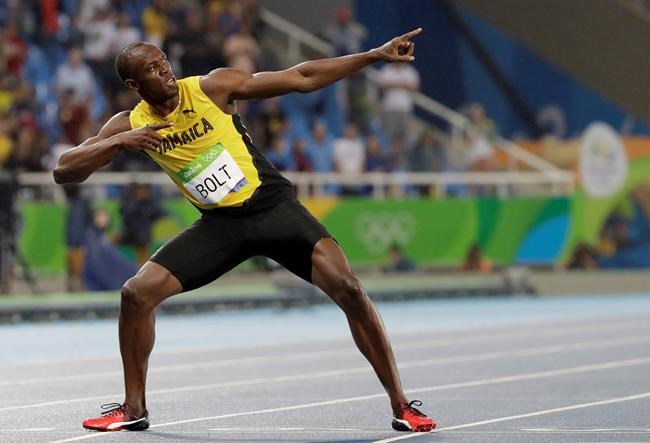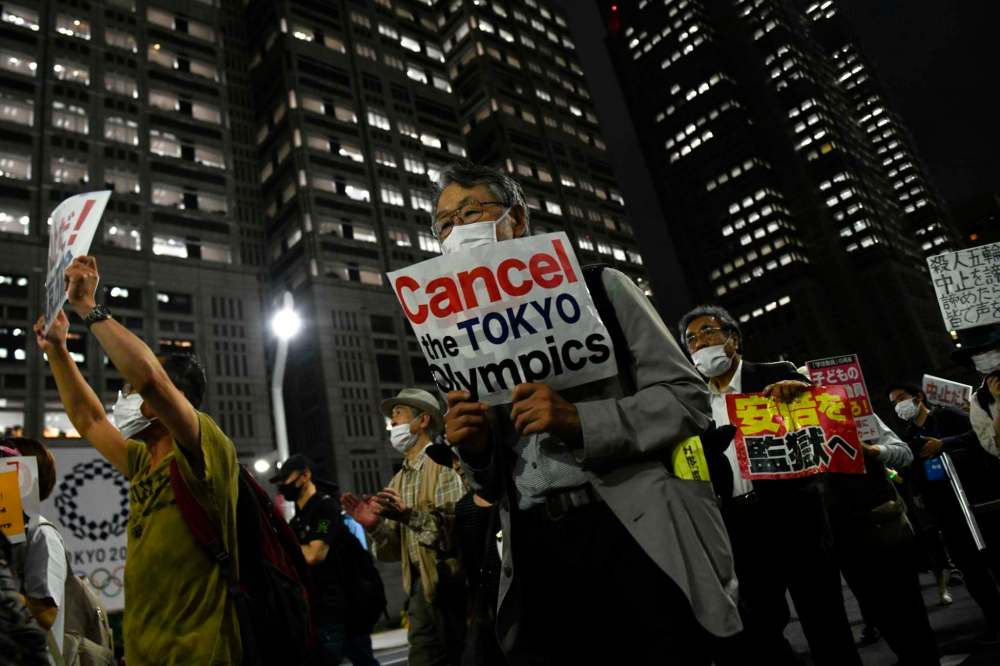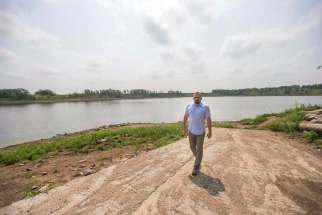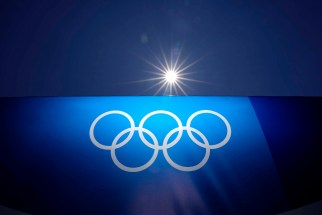Rings tarnished beyond repair Inspiring Olympic moments can't paper over hubris at core of event
Read this article for free:
or
Already have an account? Log in here »
To continue reading, please subscribe:
Monthly Digital Subscription
$0 for the first 4 weeks*
- Enjoy unlimited reading on winnipegfreepress.com
- Read the E-Edition, our digital replica newspaper
- Access News Break, our award-winning app
- Play interactive puzzles
*No charge for 4 weeks then price increases to the regular rate of $19.00 plus GST every four weeks. Offer available to new and qualified returning subscribers only. Cancel any time.
Monthly Digital Subscription
$4.75/week*
- Enjoy unlimited reading on winnipegfreepress.com
- Read the E-Edition, our digital replica newspaper
- Access News Break, our award-winning app
- Play interactive puzzles
*Billed as $19 plus GST every four weeks. Cancel any time.
To continue reading, please subscribe:
Add Free Press access to your Brandon Sun subscription for only an additional
$1 for the first 4 weeks*
*Your next subscription payment will increase by $1.00 and you will be charged $16.99 plus GST for four weeks. After four weeks, your payment will increase to $23.99 plus GST every four weeks.
Read unlimited articles for free today:
or
Already have an account? Log in here »
Hey there, time traveller!
This article was published 22/07/2021 (1602 days ago), so information in it may no longer be current.
The Olympics weave a magical dream, but with each passing edition it gets more difficult to believe it. Every Games is marred, in some way, by untenable problems: eye-popping costs, venues built to show off and then left to languish, labour violations, environmental degradations and displacement of poor people.
Yet every two years, the Games feed us moments that are so vibrant, and so uniquely connecting, they distract us just enough from the darkness. Sidney Crosby scores a golden goal. Usain Bolt streaks into legend. Simone Biles soars, Michael Phelps endures, Jon Montgomery chugs a beer and becomes an icon.
Underneath those heroics, there are always the stories of humanity that shone away from the podium. In 2016, an American runner helped an injured competitor limp to the finish. In 1988 Canadian sailor Lawrence Lemieux set aside his dream and left his race to rescue two athletes who were struggling in the water.
There is a unique thrill in all of these, in watching normal people become great, and great people achieve ever greater things. And every now and again, an athlete from some tiny country reaches the podium and you weep for them, because you can see in the radiant light of their eyes just how much it means.

The IOC knows how easy it is to fall in love with these moments, and so it used them. It wrapped them around itself like a cloak, concealing its true shape beneath something inspiring and human. Each Games, it promised, was a noble adventure, a celebration of our collective potential, a legacy being written in tears and gold.
Well, it can stop writing now. Because no matter what happens on the field or the track or the court, we already know what the legacy of Tokyo 2020 will be. It’s that, after this, we can no longer pretend the Olympic dream is anything other than a veil of gauze, stretched thin over a ravenous machine of power and greed.
There is no way to speak about these Games, other than bluntly. So let’s start with this: they should not be happening. Once it became clear the global COVID-19 crisis would not have retreated by this summer, Tokyo 2020 should have been cancelled, both for safety and out of respect for all who still suffer.
Yet bound by both hubris and contracts, the IOC, along with the host country’s officials, have refused to change course. In so doing they are choosing to set a stage for what will at best be an economic and logistical mess; at worst, one with a quantifiable cost in human life.
But why? At this point, who is Tokyo 2020 even for? Because it’s certainly not for anyone who lives near it.

These Olympics are not so much being hosted by Tokyo, as inflicted upon its people. They don’t want it. One survey found that 83 per cent of Japanese wanted the Olympics to be cancelled; a friend in Osaka told me he has yet to meet a single person in Japan who wants to see them go forward.
Protests have met with resistance. One Tokyo resident was visited by police after he tweeted about putting up a small, inoffensive sign protesting the Games, and made to write a document stating he knew posting unauthorized signs was illegal. On Twitter, the hashtag orinpikku chuushi — cancel the Olympics — is getting a workout.
Yet officials show no desire to listen. At a news conference this week, Japanese Prime Minister Yoshihide Suga said it would be the “simplest” decision to cancel the Olympics but that the “role of government is to take on the challenge,” a statement that, given the situation, tripped over the line from tone-deaf to nearly offensive.
The response was furious: “lives hang on this challenge,” one person tweeted, in Japanese.
Meanwhile, in the five days leading up to the opening ceremonies, the headlines were a morass of chaos and rising tension. Where to start? Is it the fact that there were 87 positive cases linked to the Olympics before the Games officially began? Or early reports the bubble system was perhaps not as airtight as planned?
Cases in Tokyo are ballooning, all of its 9,114 designated beds for COVID-19 patients are taken and, owing to a sluggish vaccine effort, only 23 per cent of Japanese are fully vaccinated.
Toyota, a $1.3 billion Games sponsor, pulled its domestic television ads in Japan, so bad is the stench of being linked to these Olympics. Most of Great Britain’s delegation pulled out of the opening ceremonies, and the U.S. gymnastic team fled the Olympic Village over COVID-19 fears, even as one of its own tested positive.
(That’s just the pandemic stuff. There is also the opening ceremonies director fired one day before the event for past jokes about the Holocaust; the Olympics composer fired when came out that, as a student, he had brutally abused peers with disabilities; and the large bear that’s been prowling around the softball venue.)
Meanwhile, cases in Tokyo are ballooning, all of its 9,114 designated beds for COVID-19 patients are taken and, owing to a sluggish vaccine effort, only 23 per cent of Japanese are fully vaccinated — a fact for which, given the nation’s wealth and well-developed infrastructure, there are no reasonable excuses.
Still, the IOC doesn’t seem too worried. The event will be safe, famously autocratic IOC president Thomas Bach keeps insisting, a curious level of confidence given the epidemiology on the ground and the choice not to make vaccination mandatory for the 30,000 visiting athletes and support staff inside the Olympic bubble.
In May, doctors across Japan begged officials to cancel the Olympics, with one open letter saying it would be “impossible” to do safely. This week, Bach declared that “we can only be together today because of the heroic efforts of all the doctors, nurses” and other health-care workers around the globe.
Worst of all is the fact that everyone could see this coming– except, apparently, those organizing the thing.
Strange way of thanking them, then. Japan has one of the best health-care systems on the planet, but it is being tested, and its workers are, like their peers all over the world, exhausted. Now, all they can do is watch this glum charade of celebration unfold, while anxiously hoping it won’t lead to scores of new patients.
This is a tragedy unfolding along every axis. Tokyo deserved better, even if better meant nothing at all. The only good of the Olympics, outside the stories of the athletes, is in the chance it gives a nation and a culture to share the best of itself with the world; that can’t happen, in these clipped and quarantined Olympics.
Worst of all is the fact that everyone could see this coming — except, apparently, those organizing the thing.
This week, one Japanese official anonymously lamented to the Mainichi Shimbun newspaper that the Games are norowareteiru, they are cursed. Yeah, no. A lightning strike might be a curse; every disaster unfolding now was foreseen or foreseeable, the natural outcome of the IOC’s decisions (well, except for the bear).
The Tokyo 2020 Olympics aren’t cursed. They are simply proceeding along the only path that was laid for them.
The Tokyo 2020 Olympics aren’t cursed. They are simply proceeding along the only path that was laid for them.
There is a staggering amount of blame to go around, all of it deserved. Japanese bureaucrats failed their people. The IOC failed the athletes and the whole world. They thought they could hide their sins beneath the shroud of a dream — it worked so well before! — but COVID-19 has made it impossible not to see through the holes.
And when these Games are over, it will be time to take a long, hard look at how the Olympics must be radically reimagined, in order to do right not just by its executives and sponsors, but by the world. In order to salvage the good of the games, they will have to become less unwieldy, more honest and above all, more accountable.
Let’s hope that happens sooner, rather than later. Because while the world braces for an incoming Delta variant wave, there’s another Olympics coming in just under seven months. Until then, and very likely later, the Olympic dream is dead. The IOC killed it. All we can do now is hope its recklessness doesn’t kill anyone else.
melissa.martin@freepress.mb.ca
Our newsroom depends on a growing audience of readers to power our journalism. If you are not a paid reader, please consider becoming a subscriber.
Our newsroom depends on its audience of readers to power our journalism. Thank you for your support.









